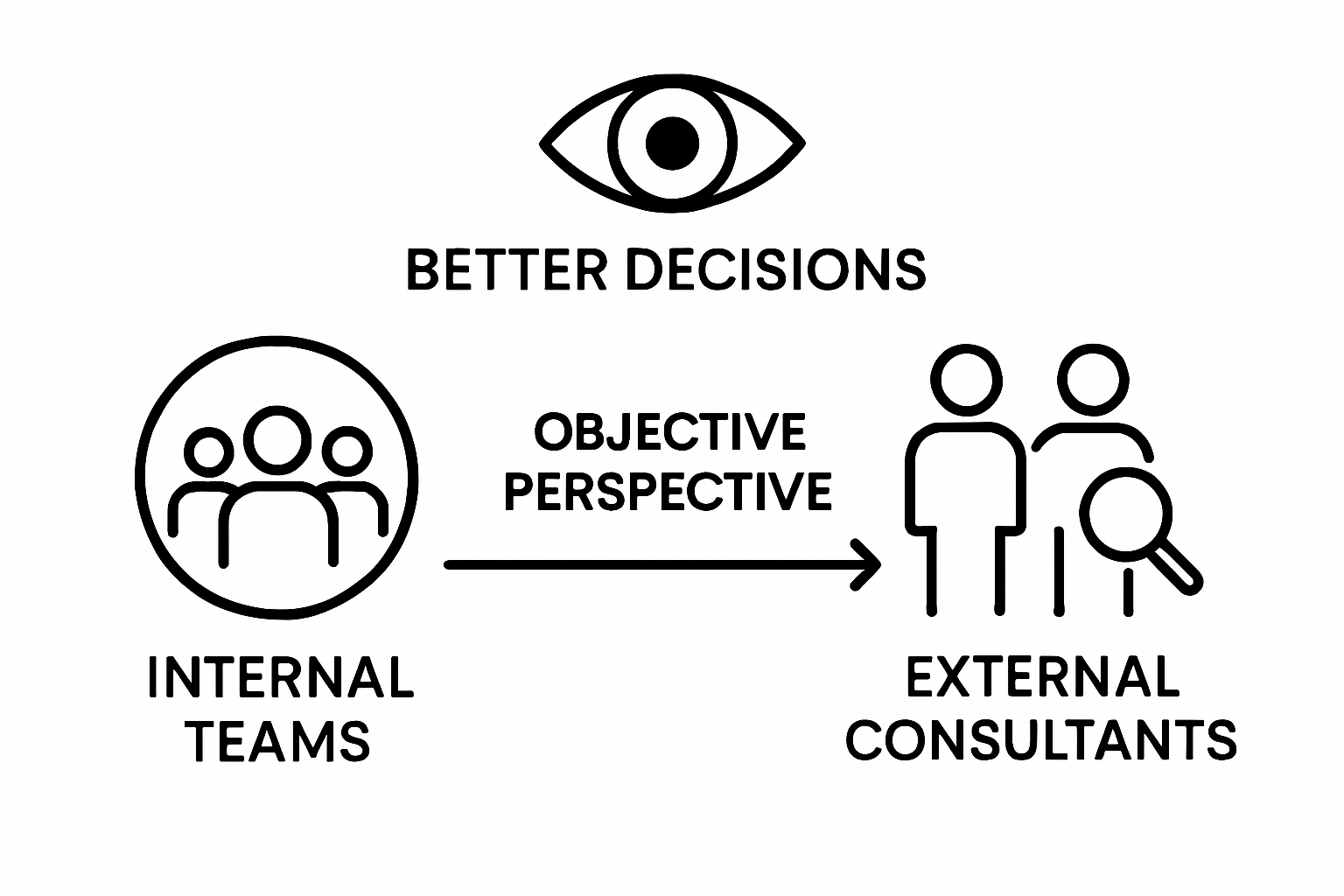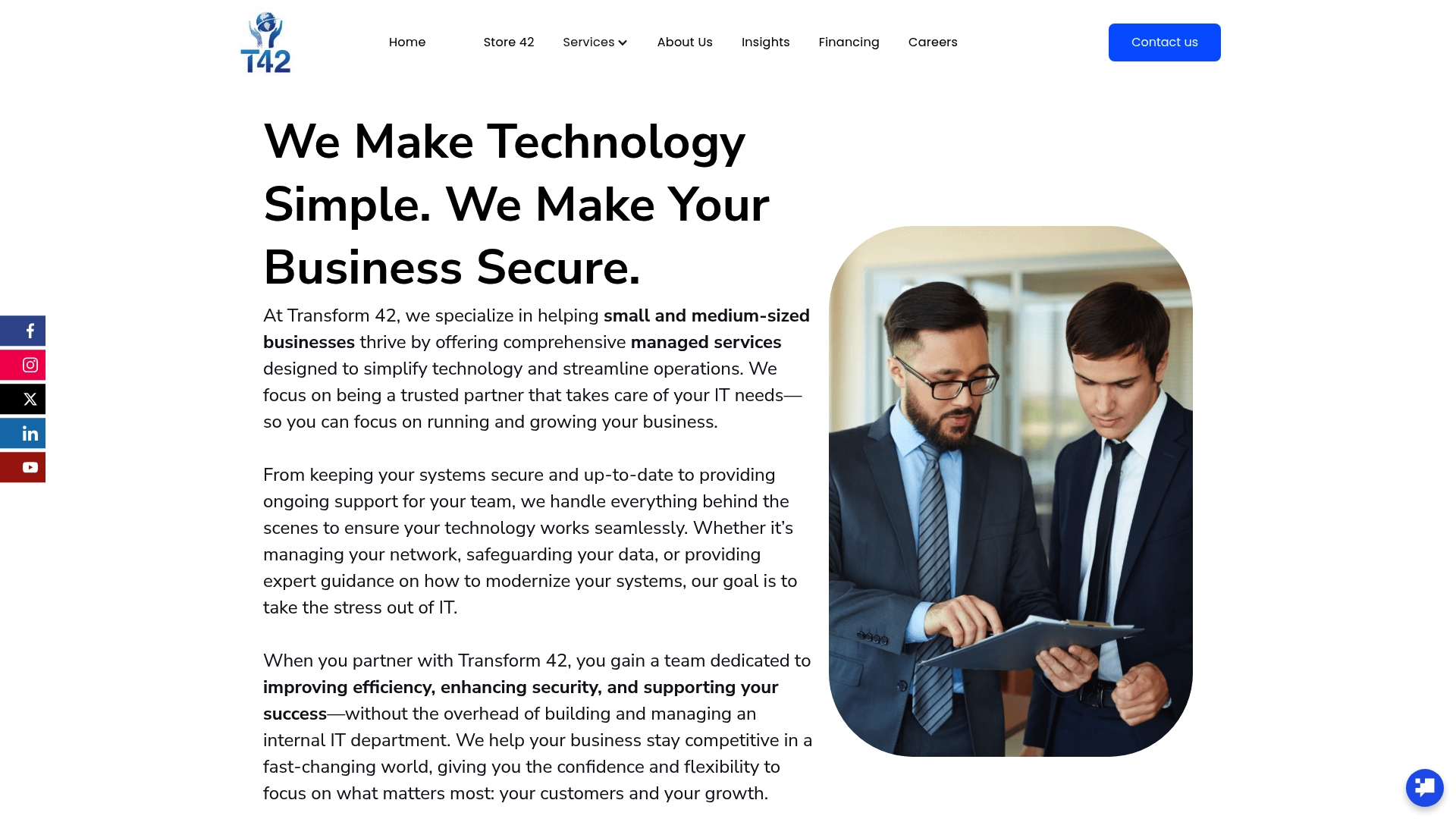
Businesses face challenges that grow more complicated every year. Companies that work with strategic consultants are 70 percent more likely to create breakthrough growth strategies than those who go it alone. That sounds impressive, but there is an unexpected advantage most leaders miss. Strategic consulting is not just about solving existing problems. It is about revealing opportunities and building the kind of future proof resilience that keeps companies thriving while others fall behind.
TakeawayExplanationStrategic consulting drives organizational growth.It transforms challenges into advantages, positioning companies for future success in competitive markets.Engage consultants for objective insights.External experts provide unbiased perspectives that can identify hidden opportunities and risks in your organization.Invest in strategic frameworks for dynamic planning.Tailored strategic roadmaps help organizations implement innovative solutions and navigate complex market dynamics effectively.Foster long-term strategic resilience.The ultimate goal is not only to solve current problems but to build adaptive capabilities for sustained success.Leverage technology in strategic consulting.Advanced tools enhance insights, allowing for predictive modeling and scenario simulations that inform strategic decisions.
Strategic consulting represents a sophisticated professional service designed to help organizations navigate complex business challenges and develop robust strategies for sustainable growth. At its core, strategic consulting provides expert guidance that transforms organizational thinking from reactive problem solving to proactive strategic planning.
Strategic consulting goes beyond traditional advisory services by offering comprehensive analysis and actionable recommendations tailored to an organization’s specific context. Consultants in this field work closely with leadership teams to:
According to research from the Strategy Consulting Organization, strategic consulting focuses on supporting both private and public sector clients with developing organizational strategies that drive meaningful transformation.
The primary value of strategic consulting lies in its ability to provide external, objective perspectives that internal teams might overlook.

Professional strategic consultants bring specialized expertise, advanced analytical tools, and cross-industry insights that enable organizations to make more informed decisions.
Strategic consultants function as strategic partners, helping leadership teams:
By combining rigorous research methodologies with deep industry knowledge, strategic consultants help organizations move beyond incremental improvements toward transformative strategic initiatives that can fundamentally reshape their competitive positioning.
Strategic consulting has emerged as a critical catalyst for business growth, offering organizations powerful tools to transform potential challenges into sustainable competitive advantages. While traditional business approaches often rely on historical data and incremental improvements, strategic consulting introduces a forward looking methodology that reimagines organizational potential.
Businesses operating in complex, rapidly changing markets require more than conventional problem solving techniques. Strategic consulting provides a structured approach to identifying and leveraging opportunities that might otherwise remain hidden. Successful organizations recognize strategic consulting as an investment in their future, not merely an expense.
Companies engaging strategic consultants gain significant advantages through:
According to research from McKinsey Global Institute, organizations that integrate strategic consulting principles are 70% more likely to develop breakthrough growth strategies compared to those relying solely on internal resources.
Modern business environments demand agility and sophisticated strategic thinking. Strategic consulting helps organizations transcend traditional operational boundaries by providing:
By bridging knowledge gaps and introducing cutting edge strategic approaches, consultants enable businesses to anticipate market shifts, reallocate resources efficiently, and create sustainable competitive differentiation. The ultimate goal of strategic consulting extends beyond immediate problem solving to building organizational capabilities that support long term strategic resilience.

Strategic consulting operates as a sophisticated process of organizational problem solving and strategic development, involving systematic approaches that transform complex business challenges into actionable strategic frameworks. The methodology goes far beyond simple recommendations, creating comprehensive roadmaps that enable meaningful organizational transformation.
Strategic consulting follows a rigorous, structured approach that begins with deep organizational assessment and culminates in transformative recommendations. This process involves multiple interconnected stages designed to provide holistic insights and practical solutions.
The typical strategic consulting engagement encompasses several critical phases:
According to research from Columbia University’s Strategy Consulting Practice, successful strategic consulting requires a combination of analytical rigor, industry expertise, and innovative thinking.
A strategic consulting engagement is characterized by its collaborative and comprehensive nature. Consultants work intimately with organizational leadership, bringing external perspectives and specialized expertise to uncover potential strategies that internal teams might overlook.
Core elements that define strategic consulting include:
By integrating deep industry knowledge with sophisticated analytical tools, strategic consultants help organizations develop nuanced strategies that address immediate challenges while positioning them for future growth and competitive advantage. The ultimate goal is not just solving current problems but creating adaptive organizational capabilities that enable sustained strategic success.
Strategic consulting represents a sophisticated discipline grounded in complex analytical frameworks and deep organizational understanding. By integrating multiple interdisciplinary approaches, strategic consultants transform intricate business challenges into actionable, strategic solutions that drive meaningful organizational transformation.
Strategic consulting operates on several fundamental principles that distinguish it from traditional business advisory services. These principles create a structured approach to solving complex organizational challenges and developing innovative strategies.
Key foundational principles include:
According to Harvard Business School research, successful strategic consulting requires a combination of analytical rigor, cross functional understanding, and innovative thinking.
Strategic consulting relies on sophisticated conceptual frameworks that enable comprehensive organizational analysis. These frameworks help consultants move beyond surface level observations to uncover deeper strategic insights and potential transformation opportunities.
Essential conceptual frameworks encompass:
By applying these advanced conceptual tools, strategic consultants provide organizations with nuanced perspectives that transcend traditional problem solving approaches. The ultimate objective is not merely addressing immediate challenges but creating adaptive strategies that position organizations for sustainable competitive advantage and long term growth.
The following table summarizes the foundational principles and conceptual frameworks that underpin strategic consulting, helping clarify their distinct roles and contributions to organizational transformation.
Principle or FrameworkDescriptionObjective AnalysisGrounded, unbiased evaluation that ensures recommendations are based on facts and evidence.Hypothesis Driven Problem SolvingUses logical hypotheses to guide investigation and solution development.Multidimensional AssessmentExamines organizations across multiple dimensions for a comprehensive strategic approach.Evidence Based RecommendationRelies on data and research to inform actionable strategies.Competitive Landscape MappingAnalyzes competitors and market trends to identify strategic advantages.Value Chain OptimizationIdentifies and enhances value-creating activities for improved efficiency and impact.Organizational Transformation RoadmapProvides a step-by-step guide for sustained and effective change within the organization.
Strategic consulting transcends theoretical frameworks by delivering practical solutions across diverse industries and organizational contexts. Real-world applications demonstrate the transformative potential of strategic consulting, showcasing how sophisticated analytical approaches can drive meaningful organizational change and competitive advantage.
Different industries require tailored strategic approaches that address unique challenges and opportunities. Strategic consultants leverage specialized knowledge to develop targeted solutions that address complex business dynamics.
Key industry applications include:
According to research exploring Soft Systems Methodology, strategic consulting provides holistic approaches to understanding and addressing complex organizational challenges across multiple sectors.
Modern strategic consulting increasingly incorporates advanced technological tools and methodologies to enhance analytical capabilities and strategic recommendations. Emerging technologies like artificial intelligence and data analytics are reshaping the strategic consulting landscape, enabling more precise and predictive organizational insights.
Technological integration enables strategic consultants to:
By bridging technological innovation with deep organizational understanding, strategic consultants help businesses navigate increasingly complex and rapidly evolving market environments. The goal extends beyond traditional problem solving to creating adaptive, future ready organizational strategies that anticipate and respond to emerging challenges.
You have read how strategic consulting helps organizations shift from reactive problem-solving to proactive, growth-focused planning. Maybe your business is struggling to keep up with constant change or feeling unsure about developing the right strategy for digital transformation. Many businesses face challenges like hidden inefficiencies, lack of competitive insight, or uncertainty about what steps to take next. The article explained how having an external partner with deep expertise and data-driven frameworks can reveal new opportunities and protect against risks that internal teams might not see.

Let Transform 42 Inc. help you put these principles into action for your business. Our technology-focused consultants are experts in digital transformation, managed IT services, and guiding small and midsize companies through change. Visit Transform 42 Inc. to see how our solutions turn strategy into results. Ready to discover breakthrough growth strategies and gain a true competitive advantage? Connect with us now and start building your future with proven expertise. For tailored advice, learn more about our digital transformation services and how we deliver IT-as-a-Service.
Strategic consulting is a professional service aimed at helping organizations navigate complex business challenges and develop sustainable growth strategies through expert guidance and tailored recommendations.
Strategic consulting is crucial for business growth because it provides organizations with external perspectives, advanced analytical tools, and specialized expertise that can transform challenges into competitive advantages and guide strategic decision-making.
Strategic consulting goes beyond typical advisory services by offering comprehensive analysis, actionable recommendations, and a structured approach to problem solving that focuses on long-term organizational transformation rather than just immediate solutions.
A strategic consulting engagement typically includes phases such as organizational diagnostics, market and competitive analysis, opportunity identification, solution development, and implementation planning. These stages create a roadmap for meaningful organizational change.